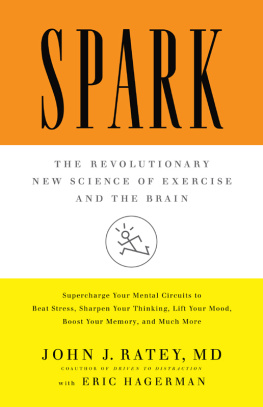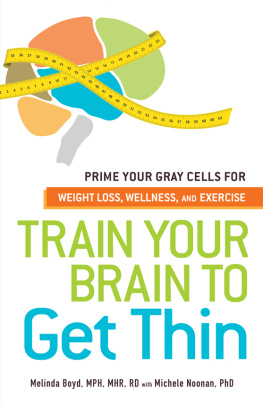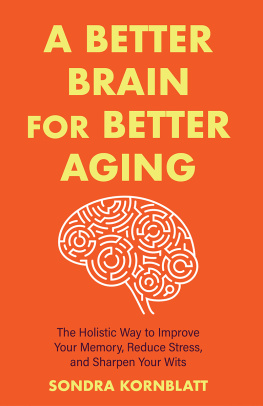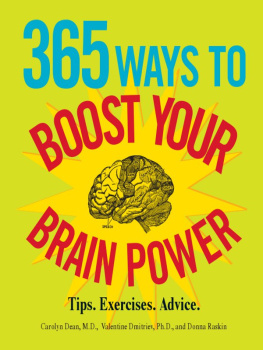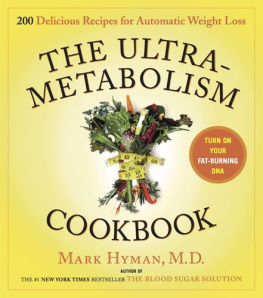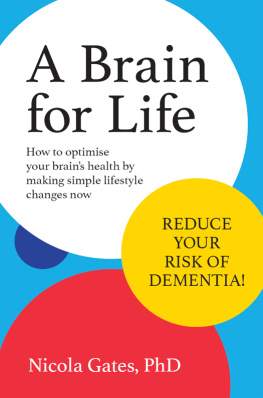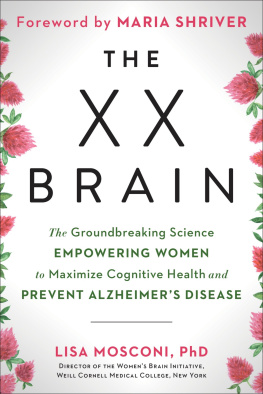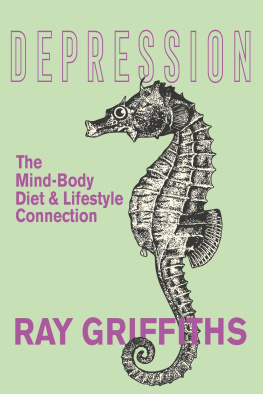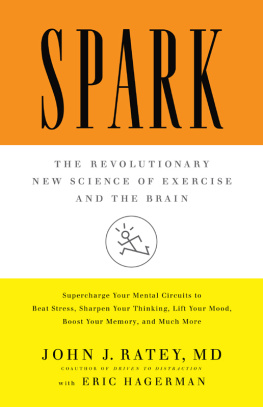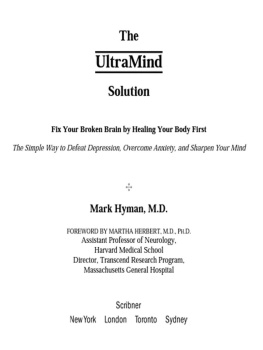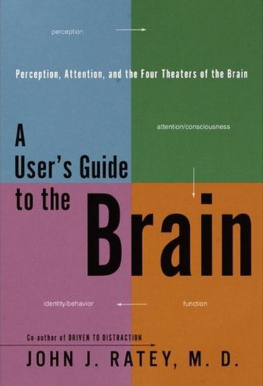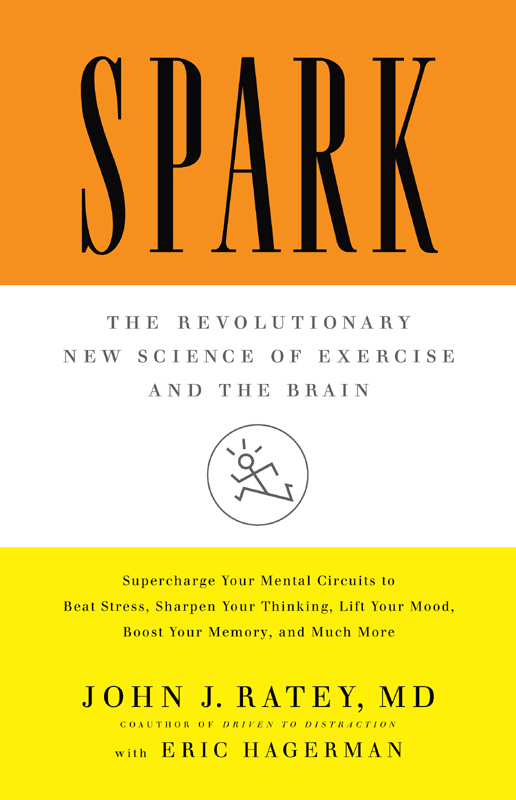Copyright 2008 by John J. Ratey, MD
All rights reserved. Except as permitted under the U.S. Copyright Act of 1976, no part of this publication may be reproduced, distributed, or transmitted in any form or by any means, or stored in a database or retrieval system, without the prior written permission of the publisher.
Little, Brown and Company
Hachette Book Group
237 Park Avenue, New York, NY 10017
Visit our Web site at www.HachetteBookGroup.com
First eBook Edition: January 2008
The exercise program and other information contained in this book should not be followed without first consulting your health care professional.
The information contained in this book is based on sources that the authors believe to be reliable. See www.johnratey.com for source information.
ISBN: 978-0-316-02835-6
ALSO BY JOHN J. RATEY, MD
A Users Guide to the Brain
Shadow Syndromes
The Neuropsychiatry of Personality Disorders
Mental Retardation
WITH EDWARD M. HALLOWELL, MD
Delivered from Distraction
Driven to Distraction
Answers to Distraction
To Kenneth Cooper, Carl Cotman, and Phil Lawler, three revolutionaries without whom this book could not have been written
In order for man to succeed in life, God provided him with two means, education and physical activity. Not separately, one for the soul and the other for the body, but for the two together. With these two means, man can attain perfection.
Plato
Making the Connection
WE ALL KNOW that exercise makes us feel better, but most of us have no idea why. We assume its because were burning off stress or reducing muscle tension or boosting endorphins, and we leave it at that. But the real reason we feel so good when we get our blood pumping is that it makes the brain function at its best, and in my view, this benefit of physical activity is far more important and fascinating than what it does for the body. Building muscles and conditioning the heart and lungs are essentially side effects. I often tell my patients that the point of exercise is to build and condition the brain.
In todays technology-driven, plasma-screened-in world, its easy to forget that we are born movers animals, in fact because weve engineered movement right out of our lives. Ironically, the human capacity to dream and plan and create the very society that shields us from our biological imperative to move is rooted in the areas of the brain that govern movement. As we adapted to an ever-changing environment over the past half million years, our thinking brain evolved from the need to hone motor skills. We envision our hunter-gatherer ancestors as brutes who relied primarily on physical prowess, but to survive over the long haul they had to use their smarts to find and store food. The relationship between food, physical activity, and learning is hardwired into the brains circuitry.
But we no longer hunt and gather, and thats a problem. The sedentary character of modern life is a disruption of our nature, and it poses one of the biggest threats to our continued survival. Evidence of this is everywhere: 65 percent of our nations adults are overweight or obese, and 10 percent of the population has type 2 diabetes, a preventable and ruinous disease that stems from inactivity and poor nutrition. Once an affliction almost exclusively of the middle-aged, its now becoming an epidemic among children. Were literally killing ourselves, and its a problem throughout the developed world, not merely a province of the supersize lifestyle in the United States. Whats even more disturbing, and what virtually no one recognizes, is that inactivity is killing our brains too physically shriveling them.
Our culture treats the mind and body as if they are separate entities, and I want to reconnect the two. The mind-body connection has fascinated me for years. My very first lecture, to fellow medical professionals at Harvard, in 1984, was titled The Body and Psychiatry. It focused on a novel drug treatment, for aggression, that affected both the body and the brain, which I stumbled on as a resident working in the Massachusetts state hospital system. My experience working with the most complicated psychiatric patients set me on a path of investigation into the ways in which treating the body can transform the mind. Its been an enthralling journey, and though it continues, its time to deliver that message to the public. What neuroscientists have discovered in the past five years alone paints a riveting picture of the biological relationship between the body, the brain, and the mind.
To keep our brains at peak performance, our bodies need to work hard. In Spark, Ill demonstrate how and why physical activity is crucial to the way we think and feel. Ill explain the science of how exercise cues the building blocks of learning in the brain; how it affects mood, anxiety, and attention; how it guards against stress and reverses some of the effects of aging in the brain; and how in women it can help stave off the sometimes tumultuous effects of hormonal changes. Im not talking about the fuzzy notion of runners high. Im not talking about a notion at all. These are tangible changes, measured in lab rats and identified in people.
It was already known that exercise increases levels of serotonin, norepinephrine, and dopamine important neurotransmitters that traffic in thoughts and emotions. Youve probably heard of serotonin, and maybe you know that a lack of it is associated with depression, but even many psychiatrists I meet dont know the rest. They dont know that toxic levels of stress erode the connections between the billions of nerve cells in the brain or that chronic depression shrinks certain areas of the brain. And they dont know that, conversely, exercise unleashes a cascade of neurochemicals and growth factors that can reverse this process, physically bolstering the brains infrastructure. In fact, the brain responds like muscles do, growing with use, withering with inactivity. The neurons in the brain connect to one another through leaves on treelike branches, and exercise causes those branches to grow and bloom with new buds, thus enhancing brain function at a fundamental level.
Neuroscientists have just begun studying exercises impact within brain cells at the genes themselves. Even there, in the roots of our biology, theyve found signs of the bodys influence on the mind. It turns out that moving our muscles produces proteins that travel through the bloodstream and into the brain, where they play pivotal roles in the mechanisms of our highest thought processes. They bear names such as insulin-like growth factor (IGF-1) and vascular endothelial growth factor (VEGF), and they provide an unprecedented view of the mind-body connection. Its only in the past few years that neuroscientists have begun to describe these factors and how they work, and each new discovery adds awe-inspiring depth to the picture. Theres still much we dont understand about what happens in the microenvironment of the brain, but I think what we do know can change peoples lives. And maybe society itself.
Why should you care about how your brain works? For one thing, its running the show. Right now the front of your brain is firing signals about what youre reading, and how much of it you soak up has a lot to do with whether there is a proper balance of neurochemicals and growth factors to bind neurons together. Exercise has a documented, dramatic effect on these essential ingredients. It sets the stage, and when you sit down to learn something new, that stimulation strengthens the relevant connections; with practice, the circuit develops definition, as if youre wearing down a path through a forest. The importance of making these connections carries over to all of the issues I deal with in this book. In order to cope with anxiousness, for instance, you need to let certain well-worn paths grow over while you blaze alternate trails. By understanding such interactions between your body and your brain, you can manage the process, handle problems, and get your mind humming along smoothly. If you had half an hour of exercise this morning, youre in the right frame of mind to sit still and focus on this paragraph, and your brain is far more equipped to remember it.

